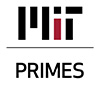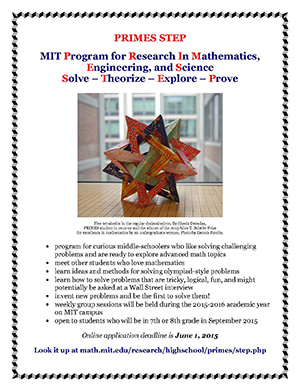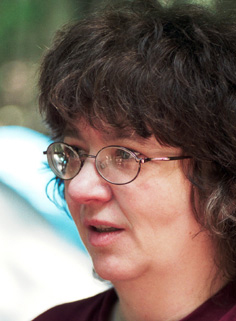 PRIMES STEP
PRIMES STEP
What is PRIMES STEP?

PRIMES STEP (Solve–Theorize–Explore–Prove) is your step into the world of mathematical discovery. It is a program for curious middle-schoolers who like solving challenging problems and are ready to explore advanced math topics.
The goal of our program is to use mathematics to expand the students' minds and encourage their creative thinking. We will not repeat the middle-school math curriculum. We will solve a lot of problems that are tricky, logical, fun, and might potentially be asked at a Wall Street interview. See some examples in the left column.
In addition to solving problems like these, we will cover some ideas and methods for solving olympiad-style problems. We will also try to simulate the research process by inventing new problems and being the first to solve them. We will even learn an occasional magic trick. The main goal is to have fun!
The instructor is Dr. Tanya Khovanova, an active researcher in the field of recreational mathematics. There are two groups, 10 students each, which meet on either Mondays or Thursdays, 6-8 pm, on MIT campus.
STEP meetings are strictly following MIT COVID policies and rules for visitors .
Research papers authored by PRIMES STEP students were featured on the American Mathematical Society blog .
Instructor

Tanya Khovanova is Lecturer in the Mathematics Department at MIT. She received her Ph.D. in mathematics from Moscow State University in 1988, under Israel Gelfand . Her research was in representation theory, integrable systems, quantum groups, and superstring theory. Currently she is interested in combinatorics and recreational mathematics. Dr. Khovanova is Head Mentor of math research at MIT PRIMES and MIT's Research Science Institute (RSI) . She has created the popular Number Gossip site.
PRIMES STEP students' research papers
- Who Is Guilty? (2016) published in Recreational Mathematics Magazine 8:15 (2021): 41–52 [PDF]
- Alternator Coins (2016), published in Math Horizons 25:1 (2017): 22–25 [PDF]
- On Variations of Nim and Chomp (2017), published in The Minnesota Journal of Undergraduate Mathematics 4:1 (September 2018)
- PRIMES STEP Plays Games (2017), published in Math Horizons 26:2 (2018): 10–13 [PDF]
- On Base 3/2 and its Sequences (2018), published in The Mathematical Intelligencer 43:2 (2021): 92-98 [PDF]
- Variants of Base 3 over 2 (2018), published in Journal of Integer Sequences 23 (2020) [PDF]
- Chip-Firing and Fractional Bases (2018), published in The Minnesota Journal of Undergraduate Mathematics 6:1 (2021) [PDF]
- It's Common Knowledge (2019) , published in Recreational Mathematics Magazine 6:12 (2019): 9–32 [PDF]
- Confirming the Labels of Coins in One Weighing (2019)
- The No-Flippancy Game (2020)
- The Classification of Magic SET Squares (2020), published in Recreational Mathematics Magazine 7:13 (2020): 71–94
- From Unequal Chance to a Coin Game Dance: Variants of Penney's Game (2020), published in Recreational Mathematics Magazine 8:14 (2021): 19–38
- The Stable Matching Problem and Sudoku (2021), published in The College Mathematics Journal (2023)
- Sequences of the Stable Matching Problem (2021), published in Journal of Integer Sequences, vol. 27 (2024), article 24.2.2
- Fun with Latin Squares (2021), published in Recreational Mathematics Magazine 10:17 (2023): 51–74
- Generalizing the Wythoff Array and other Fibonacci Facts to Tribonacci Numbers (2022)
- The Struggles of Chessland (2022), published in Recreational Mathematics Magazine 11:18 (2024): 65–97
- Maximum Number of Quads (2023), published in Intelligence Planet: Journal of Mathematics and Its Applications 1:1 (2024)
- Card Games Unveiled: Exploring the Underlying Linear Algebra (2023)
- EvenQuads Game and Error-Correcting Codes (2023), published in Springer Nature Computer Science 6, 763 (2025)
- Quad Squares (2023)
- SOS (2023)
- Fibonometry and Beyond (2024)
- Card Tricks and Information (2024)
- Fibonacci Partial Sums Tricks (2024)
- Chip-Firing on Infinite k-ary Trees (2025), published in Enumerative Combinatorics and Applications 6:1 (2026), article #S2R7
- Mathematics of Gozinta Boxes (2025)
Game of Life-generated Christmas card for PRIMES STEP instructor Dr. Tanya Khovanova, programmed by PRIMES STEP student Evin Liang, December 2021
Admissions
The link to an online application will appear here in late April. The deadline will be in late May. Students who are in grades 6-8 in the spring (entering 7th-9th grade in September) and home schooled students of
the same age are eligible.
All applicants will be invited to an entrance quiz administered in person on MIT campus in early June. The exact location and quiz instructions will be emailed to all applicants and parents. The quiz will be the same for all grades, and the two STEP groups are not arranged by grade.
One letter of recommendation is required. We ask the recommender to comment on the applicant’s math background, maturity, industry, motivation, and teamwork skills.
For preparation, we recommend studying Contest Preparation level books in the Art of
Problem Solving series, as well as the 2015 STEP entrance test and its solutions
, and the
2016
and
2017
entrance tests (later tests and solutions will not be posted).
Admission decisions will be made by mid-June. Due to the large volume of applications, we unfortunately will not be able to comment on individual applications or release the quiz results. Solutions to the quiz will not be posted.
STEP sessions are held on campus on either Mondays or Thursdays, 6-8 pm.
Tuition for the 2025/26 academic year is $\$$2,700 per year, including $\$$100 registration fee and two installments of $\$$1,300 (due in September and in January). Need-based scholarships are available for families receiving public assistance.
If you have any questions about your application, please contact Yufei An at .
Try these problems
Problem 1. Mrs. Fullhouse has 2 sons, 3 daughters, 2 cats and 1 dog. How many children does she have?
Problem 2. Detective Radstein is investigating a robbery. He apprehends three suspects: Anne, Bill, and Caroline. The detective knows that no one else could have participated in the robbery. During the interrogation the suspects make the following statements:
Anne: I didn't do it. Bill did it alone.
Bill: I didn't do it. Caroline did it.
Caroline: I didn't do it. Bill did it.
Detective Radstein also discovered that all three suspects are members of a clan called the Halfsies. Every time they speak, they make two statements, one of which is a lie and the other of which is true. Who committed the robbery?
Problem 3. One day you meet your friend Alice enjoying a nice walk with her husband Bob and their son Carl. They are excited to see you and they invite you to their party.
Alice: Please, come to our party on Sunday at our place at 632 Elm St. in Watertown.
Bob: My wife likes exaggerating and multiplies every number she mentions by
2.
Carl: My dad compensates for my mom's exaggerations and divides every number
he mentions by 4.
Alice: Our son is not like us at all. He doesn't multiply or divide. He just
adds 8 to every number he mentions.
Where is the party?
Problem 4. There are n ants placed randomly on a stick that is 1 meter long. The ants immediately start running along the stick, choosing a random direction, either left or right, with the same constant speed equal to 1 meter per second. When two ants bump into each other they immediately reverse direction, and continue running with the same speed. When an ant reaches the end of the stick it falls off. What is the expected time for the stick to become completely free of ants?
Contact
With questions, contact PRIMES Program Director Slava Gerovitch at
